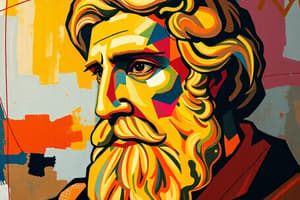Podcast
Questions and Answers
Which philosopher is primarily associated with the concept of the 'social contract'?
Which philosopher is primarily associated with the concept of the 'social contract'?
- J.S. Mill
- Hobbes (correct)
- Plato
- Karl Marx
Which Indian political thinker is known for his emphasis on the reform of Hindu society?
Which Indian political thinker is known for his emphasis on the reform of Hindu society?
- Ambedkar
- Savarkar
- Gandhi
- Ram Mohan Roy (correct)
Which of the following concepts is NOT typically associated with liberal political thought?
Which of the following concepts is NOT typically associated with liberal political thought?
- Limited government
- Social equality
- Collectivism (correct)
- Individual freedom
Which concept refers to the allocation of power and responsibilities between national and state governments?
Which concept refers to the allocation of power and responsibilities between national and state governments?
Which political ideology emphasizes gender equality and the rights of women?
Which political ideology emphasizes gender equality and the rights of women?
Which treaty is often regarded as a critical document signaling the beginning of Cold War politics?
Which treaty is often regarded as a critical document signaling the beginning of Cold War politics?
What is a key characteristic of the concept of 'Comparative Government'?
What is a key characteristic of the concept of 'Comparative Government'?
Which of the following theorists is famous for their ideas on justice and fairness in society?
Which of the following theorists is famous for their ideas on justice and fairness in society?
Flashcards
Liberty
Liberty
The ability to act freely within specified limits, often defined by laws and social norms.
Equality
Equality
The principle that all individuals should have equal rights, opportunities, and treatment regardless of their background.
Justice
Justice
The concept of fairness and impartiality in how society is structured and operates. It ensures just outcomes for everyone.
Sovereignty
Sovereignty
Signup and view all the flashcards
The State
The State
Signup and view all the flashcards
Democracy
Democracy
Signup and view all the flashcards
Political culture
Political culture
Signup and view all the flashcards
Political parties
Political parties
Signup and view all the flashcards
Study Notes
Western Political Philosophy
- Influential philosophers include Plato, Aristotle, Machiavelli, Hobbes, Locke, Rousseau, J.S. Mill, Karl Marx, and John Rawls, each contributing foundational ideas to the field.
- Key themes involve the nature of power, governance, ethics, and the role of the state in individual lives.
Indian Political Thought
- Significant thinkers are Ram Mohan Roy, Gandhi, Ambedkar, Savarkar, and Kautilya.
- Their contributions address social reform, nationalism, democracy, and the philosophy of governance in the Indian context.
Political Theory
- Core concepts include:
- Liberty: Discussion on individual freedom and limitations imposed by the state.
- Equality: Focus on equal rights, representation, and social equity.
- Justice: Theoretical frameworks that define fairness in society.
- Sovereignty: The authority of a state to govern itself.
- Citizenship and Gender: Examination of rights and roles in political participation.
- Democracy: Structure and function of democratic systems, including human rights.
- State: Analysis of the state's role in society and political life.
Contemporary Issues
- Topics such as feminism and its impact on political ideology are explored.
- National and global challenges like climate change are critically examined.
International Relations
- Key theories include Realism and Liberalism, defining power dynamics and cooperative approaches in international politics.
- Historical context of Cold War politics influences global relations.
- Organizations like NAM, SAARC, UNO, ASEAN, and EU play crucial roles in international diplomacy.
- India’s foreign policy focuses on relations especially with China, Pakistan, and USA.
Indian Government and Politics
- The Preamble and the processes involved in forming the Constituent Assembly shape the constitutional framework.
- Government structure includes:
- Parliament: Bicameral system functions.
- Cabinet: Executive decision-making body.
- Prime Minister: Head of government with significant powers.
- President: Ceremonial head of state with constitutional authority.
- Critical aspects like Fundamental Rights, Duties, and Directive Principles of State Policy guide citizen rights and state responsibilities.
- Discussion on Amendments, State Government, and Governance mechanisms.
- Examination of Federalism and roles of Political Parties at national and regional levels.
- Process of Elections and frameworks for Local Government and Judiciary.
Comparative Government and Politics
- Investigates Political Culture and its impact on civic life.
- Analyzes Political Parties, their functions and electoral strategies.
- Different Electoral Systems and their significance in democracy.
- Various Approaches/Models and classifications of Types of Regimes inform comparative analysis.
Public Policies in India
- Models and processes related to public policy-making are evaluated.
- Classification of Types of policies shows the complexity and scope of governmental initiatives.
General Issues of Contemporary Relevance
- Discourses on Global Justice highlight ethical considerations in international relations.
- Exploration of Nationalism influences contemporary political debates.
- Urgent attention is given to Climate Change and its global implications for policy and governance.
Studying That Suits You
Use AI to generate personalized quizzes and flashcards to suit your learning preferences.




